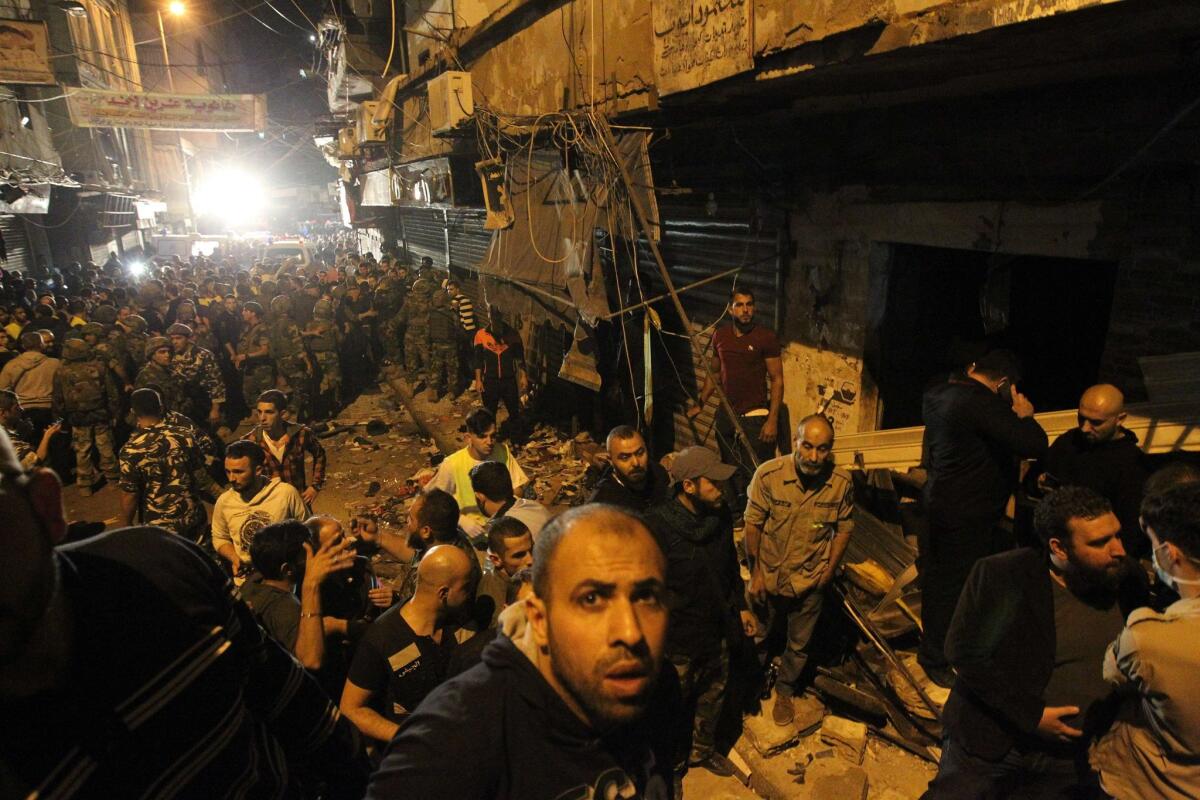Death toll in Beirut bombings reaches 43 as Islamic State claims responsibility

Emergency personnel gather at the site of twin suicide bombings Nov. 12 in Bourj al-Barajneh, in the southern suburbs of Beirut.
- Share via
reporting from beirut — The militant group Islamic State took responsibility Thursday for twin bombings that ripped through a busy residential district of south Beirut, killing at least 43 people and wounding more than 200.
The attack — by a pair of suicide assailants wearing belts packed with explosives, the authorities said — was the deadliest strike in the Lebanese capital in more than a year.
The neighborhood targeted is home to many Shiite Muslims who support Hezbollah, the Iran-backed Shiite political and paramilitary group that is fighting in Syria in support of President Bashar Assad. Hezbollah is an archenemy of Islamic State and other Al Qaeda-style Sunni Muslim extremist factions operating in both Syria and Lebanon and opposed to Assad’s rule.
Islamic State and related Sunni extremist groups regularly vow to attack Hezbollah on its home turf.
The twin bombings in the Bourj al-Barajneh district shattered months of relative calm that had prevailed in Beirut despite the bloody war raging in neighboring Syria and periodic episodes of spillover violence elsewhere in Lebanon.
A third would-be bomber apparently was killed at the scene Thursday by one of his cohorts’ blasts before he was able to blow himself up, the Lebanese army said in a statement. His belt failed to detonate, the army said.
In its statement on social media, Islamic State gave a varying version of events, saying the initial explosion was set off in a rigged motorbike parked on a street. As “apostates” gathered at the site of the first blast, the militant group said, a suicide operative blew himself up for maximum lethal effect.
The official Lebanese news service said Islamic State had named the three attackers: two Palestinians and a Syrian national.
Sunni Islamist groups largely dominate the armed uprising against Assad’s secular government, a conflict that is now in its fifth year.
Hezbollah’s military aid is widely credited with helping Assad stay in power. The presence of Hezbollah militiamen bolstered a thinly stretched Syrian army that has suffered high casualties fighting on numerous fronts.
Islamic State arose from the tumult of the Syrian conflict and now controls a self-declared “caliphate” in vast swaths of Syria and neighboring Iraq. Thursday’s strike appeared to be the group’s deadliest attack to date in Lebanon.
A U.S.-led coalition is bombing Islamic State in Syria and Iraq, while Russian and Syrian government warplanes are also attacking Islamic State in Syria. Still, Islamic State appears far from being defeated.
Lebanese authorities boosted security after a wave of bombings in 2013 and 2014 attributed to Sunni extremists. The Lebanese military and Hezbollah also worked to improve border security and prevent would-be attackers from infiltrating from Syria, and officials say security forces have disrupted a number of Islamic State cells.
However, Thursday’s attacks demonstrated the capital’s continued vulnerability.
The strikes began about 6 p.m., when the streets were crowded with shoppers and people returning from work, and cafes and restaurants were doing a brisk business. The timing seemed chosen for a maximum number of casualties.
The second suicide bomber blew himself up a few minutes after the initial explosion, authorities said. Al Qaeda-style attackers often stagger their bombings in a bid to target first responders and others who rush to the initial scene to provide aid.
Television images here showed scenes of bloody chaos. Shards of broken glass littered bloodstained streets lined by blown-out storefronts.
The Health Ministry gave the toll from the twin bombings as at least 43 dead and 239 wounded.
A stream of Lebanese politicians offered condolences and the now-standard warning that Lebanon must resist falling into a cycle of sectarian violence. The nation’s sectarian-fueled civil war ended in 1990 after 15 years of fighting that left large swaths of the capital in ruins.
The Syrian war has escalated tensions in tiny Lebanon, where Syrian refugees now account for a quarter or more of the population of about 4.5 million, according to estimates. Political disputes have left the strategically situated nation — wedged between Syria and Israel and the Mediterranean — without a president for almost 18 months, paralyzing the government. Outside powers, including Iran and Saudi Arabia, vie for power among competing Lebanese political blocs.
Nonetheless, fragile Lebanon has thus far managed to avoid falling into a new cycle of extreme violence despite the tumult next door in Syria. Authorities declared Friday an official day of mourning for the bombing victims.
Special correspondent Nabih Bulos in Dubai, United Arab Emirates, contributed to this report.
Follow McDonnell on Twitter at @mcdneville for news out of the Middle East
More to Read
Sign up for Essential California
The most important California stories and recommendations in your inbox every morning.
You may occasionally receive promotional content from the Los Angeles Times.










